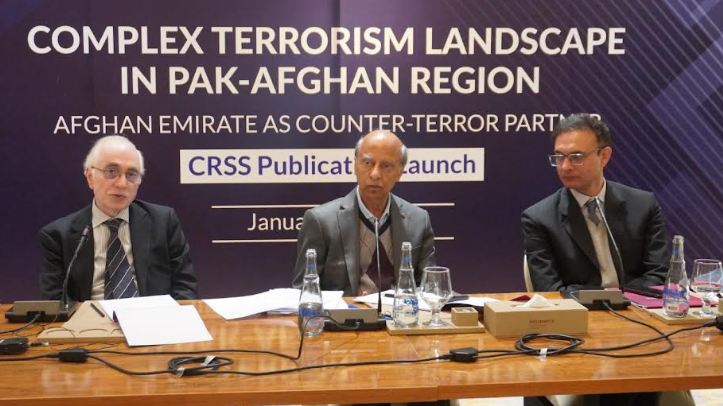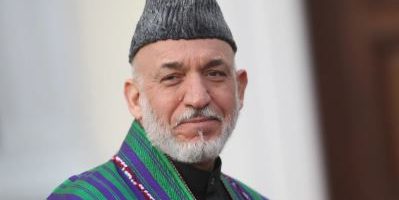Engagement with Afghanistan must to help millions in distress: UNAMA

ISLAMABAD, JAN 22 /DNA/ – Disengagement is neither an option nor helpful to Afghans. We must collectively engage with Afghanistan to create an entry point for helping millions of Afghans that are in distress, and also help the country deal with its longstanding challenges.
These remarks were made by the head of the Pakistan-based liaison office for the U.N. Assistance Missionin Afghanistan (UNAMA), Malick Ceesay, during the launching ceremony of “Complex Terrorism Landscape in Pakistan-Afghanistan Region: Afghan Emirate as Counter-TerrorPartner”, the latest publication of the Center for Research and Security Studies (CRSS). The research publication offers critical insights into the evolving dynamics of militancy in the region and explores the heightened threats posed by the Tehrik-e-Taliban Pakistan (TTP) and the Islamic State of Khorasan Province (ISKP) following the Taliban’s return to power in August 2021.
The UNAMA representative further said that peace and stability of Afghanistan is the concern of the entire international community and not just of the United Nations, all wanting to see the country prosper, stable and enjoy lasting peace as a matter of Afghanistan’s and international interest. UNAMA and UN are committed and working to make that possible through engagement, regional collaboration and coordination.
The CRSS research in its key highlights notes that contrary to the initial optimism about Taliban rule that it might bring decline in transnational terrorism and lead to regional stability, the threats have instead only intensified and it has introduced new complexities, manifest in – as far as Afghanistan’s neighbors are concerned – 66% surge in violence recorded in Pakistan in 2024, the highest in nearly a decade. The country alsowitnessed a sustained rise ini) overall violence (resulting from terrorism and counter-terrorism operations), and ii) terror attacks on Pakistan’s security forces and their resulting fatalities, for the fourth consecutive year since 2021, which coincides with the Taliban’s return to power in Afghanistan.
TTP and ISKP – now dominate the militant landscape in the region, where a closer look at them as two primary militant actors reveals that each pursuing distinct and divergent but equally destabilizing agendas. The TTP, rooted in Deobandi ideology, seeks an Islamic state in Pakistan and exploits local grievances. ISKP, a Salafi-jihadist group, prioritizes transnational jihad, carrying out mass-casualty attacks and targeting religious minorities. ISKP’s brutal agenda poses a global threat, with its tech-savvy recruitment strategies and adaptability making it a formidable adversary.
The report critiques the Taliban’s dual counter-terrorism strategy of combating ISKP through aggressive operations, viewing them as an existential threat, while tacitly supporting TTP which stems from their ideological alignment and strategic considerations. This selective approach has strained its relations with Pakistan and hindered regional counterterrorism efforts.
It recommends that Pakistan needs strategic clarity on the nature of the TTP threat and must adopt a deradicalization strategy that does not treat militancy as a monolith, instead, take into consideration the distinct ideological, socio-political, and economic drivers of groups like the TTP and ISKP. Strengthened intelligence-sharing and cross-border coordination are crucial to counter transnational threats.Community-led initiatives promoting tolerance, education, and infrastructure development can mitigate grievances that fuel militancy.
The report underscores the importance of holding the Taliban accountable for their commitments under the Doha Agreement while engaging them for counterterrorism cooperation. It highlights the need to integrate counterterrorism efforts into broader governance and development frameworks for sustainable peace.
“The rise of ISKP and the consolidation of TTP through splinter groups pose twin challenges. Their divergent objectives—localized versus transnational jihad—demand differentiated and targeted responses”, said the principal author of the report, Dr. Aamer Raza, from the department of Political Science, University of Peshawar.
Former ambassador of Pakistan to China, Masood Khalid, said that China’s engagement with the Taliban is rooted in its long-term and pragmatic interests, where stability in Afghanistan aligns with Beijing’s goals of regional economic integration and security. However, the Taliban must demonstrate their willingness to combat transnational threats.
He further saif that ETIM is a serious issue but China is likely to continue engagement with Taliban regime and not make terrorism an excuse for disengagement. The issue of transnational threats emanating from Afghanistan are a source of serious concern for all countries. The Trump administration is likely to come back to Afghanistan and seek accountability from Taliban on their Doha promises.
The executive director of CRSS, Imtiaz Gul, said that the geopolitical concerns of neighboring countries, coupled with Pakistan’s vulnerability, have made it the primary victim of cross-border militancy. We must recalibrate our policies to address the root causes of this violence.
Prominent experts, academics, and policymakers gathered at the launch event to discuss the findings and their implications for regional security, and approached consensus that the international community cannot afford to disengage from Afghanistan as it risks exacerbating security challenges, further destabilizing the region, and undermining counterterrorism progress.
Related News

ISSI roundtable discusses Afghanistan’s implications for Pakistan
ISLAMABAD, FEB 13 /DNA/ – The Centre for Afghanistan, Middle East and Africa (CAMEA) atRead More

Karzai seen as key figure for political reconciliation in Afghanistan
Shamim shahid PESHAWAR: Tensions between Pakistan and Afghanistan continue to deepen, with analysts warning thatRead More


Comments are Closed